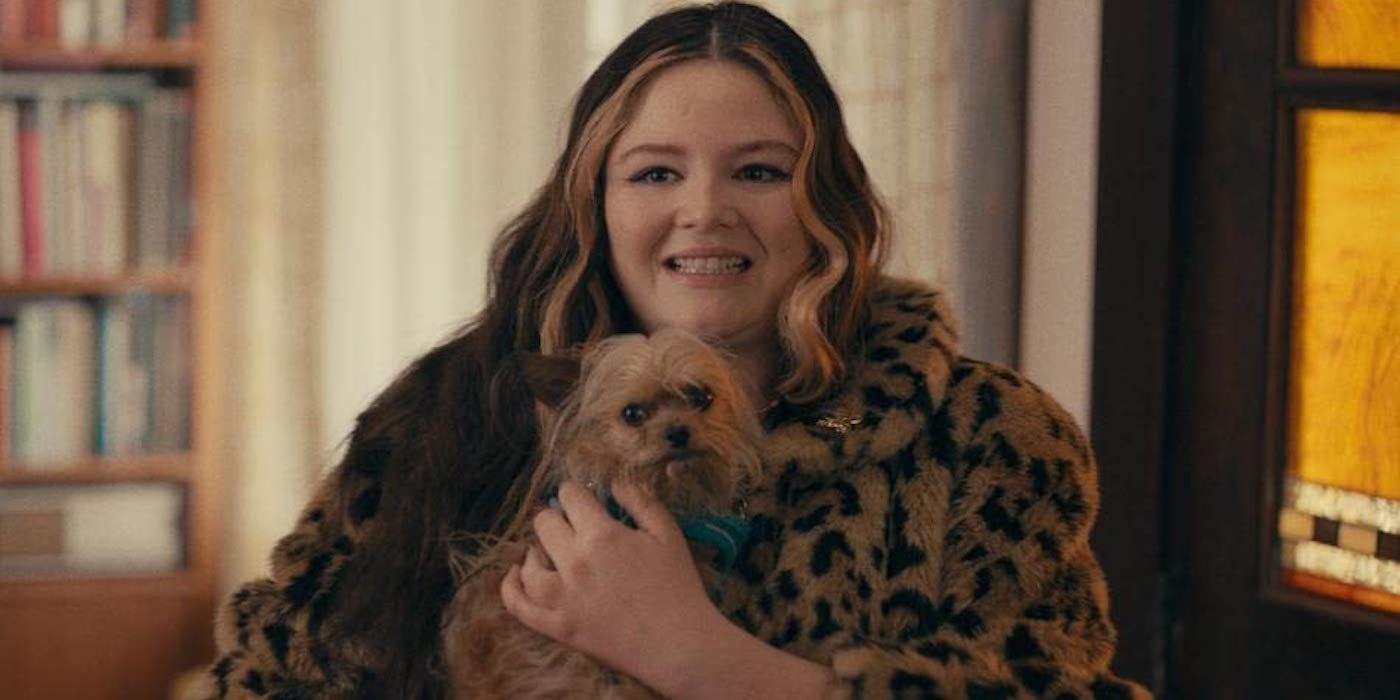The SXSW film festival has kind of harnessed a reputation of being the “cool” festival. Taking place in Austin, Texas, a city that’s also earned its respected status in the entertainment industry, it includes comedy, music, and since 1994, film and television. While it showcases genres across the board, from its extensive and gritty late-night horror lineup to thought-provoking documentaries, SXSW has a special place in its heart for comedy. It takes risks on projects, and more specifically, lets comedians take risks in their craft. Saturday Night Live alum Fred Armisen, for example, got his start there with his strange and very “Fred” short film Fred Armisen’s Guide to Music and SXSW in 1998. That’s exactly why this eclectic festival feels like the perfect home for Cora Bora, which stars the hilarious scene-stealing pro Megan Stalter as a more vulnerable and emotionally complex character than we've seen from her before.
Not only is it the first time the comedian is behind the wheel for a big project, but it’s also the first time we really get to see her range as an actor. You likely first got to know the character and improv master via her extremely specific and smart Instagram videos where she rides the line between parody and sincerity, poking fun at celebrity and Hollywood while simultaneously carving her own, very real path in the entertainment industry. (If you haven’t seen the video of her signing up for a Kohl’s card, well, then, you must.) But when she’s not dominating your social media feed, she’s performing live at some of the hottest stand-up joints in town, showing off her eccentric and unapologetic comedy style to her loyal fans who “get” it.
But to a wider audience, Stalter is most known as Kayla, the dim-witted, self-centered, and unfiltered nepo baby secretary in the critically acclaimed HBO Max comedy series Hacks. Comedy nerds see Stalter’s supporting role in a mainstream show as “about time” where others probably view it as “who is she? She’s funny!” We see shades of Kayla in Stalter’s titular character in Cora Bora. She’s a woman who has potential, but doesn’t know how to exactly wield it. She has self-doubt and can’t ask for help, and for the life of her, cannot read the room. Any room. But unlike her performance in Hacks, Stalter’s performance here isn’t always going for the laugh—and that’s okay, too.
Directed by Hannah Pearl Utt and written by Shiva Baby and Palm Trees and Power Lines executive producer Rhianon Jones, this film follows the dysfunctional Cora, an emotionally fragile but outwardly confident woman who is dealing with a lot of things. Aside from the regular, daily irritations that come with being a human who has to deal with other humans, she’s trying to get her music career (or lack thereof) some—any—traction, while also doing her best to maintain her relationship (or lack thereof) with her girlfriend. She dropped out of college and moved to Los Angeles from her native city of Portland, Oregon to pursue music full-time and was a member of The Maybe Nots, a band with a cult following. But now that the band is no longer, she’s desperate to make it solo. Emphasis on the “desperate.” She perseveres through sets where the only people in the nonexistent crowd are her discouraged manager Cristina (Chrissie Fit) and a few other people who seemed surprised that there was going to be any live entertainment to begin with.
Cora is a complicated character. You feel for her even though she can be her own worst enemy. She’s funny, both on purpose and accidentally. She’s quick to judge and yet desperate for acceptance herself. Above all, she’s messy in more ways than one. Stalter not only knows how to embody Cora, but so clearly has a respect for her, as she is sure to keep her performance grounded at times when, as someone as comedically gifted as herself, could go in for the kill. Her comedy in this film, like Cora, is wrapped in fragility. It’s most often used to diffuse an excruciatingly awkward or humiliating situation she’s backed herself into. Mostly, it’s when she’s deflecting judgment that’s sometimes not even there, but anticipated. She does her best to get ahead of the questions and comments about her music, open relationship, and nebulous life, which results in her projecting quite a bit onto people that didn’t necessarily really care about how she was doing. Stalter was born to anchor awkward situations, and unsurprisingly, she navigates them quite well.
While music is a significant portion of Cora’s identity and journey, her tricky love life is at the core of the story. She’s in an open relationship (something she is sure to make people know was her idea) with Justine, played by Fresh and Something at Tiffany’s star Jojo T. Gibbs, who lives in Portland and has essentially moved on with a woman named Riley (Ayden Mayeri). Yes, it’s an open relationship, but, that qualifier’s potency is waning rapidly. This, of course, makes things doubly cringey when Cora makes a surprise trip “home” to attend Justine’s graduate school graduation party after saying she couldn’t leave Los Angeles and miss a music opportunity.
Cora’s trip home features some Stalter-isms we know and love. There’s a performative insincerity that laces her first meeting with Riley when Cora waltzes back into the home she shared with Justine as if she hadn’t been missing from it for eight months. She “mistakes” Riley for the cleaning lady and does her best to subtly slip into conversation how she and Justine are better than they’ve ever been. Of course, this entire charade has the opposite effect and reeks of desperation. It’s funny, heartbreaking, and tense all at the same time. A particularly funny moment is when, as she is lighting up a joint, Cora asks if Riley cares if she smoked inside. When Riley asks if she’s smoking weed, Cora goes on the defensive and judgy side instantly. “Uh, yeah, are you like, a cop? Have you heard it’s, like, totally legal? It basically cures cancer. It’s a vitamin.”
Perhaps the brightest light in the film is The Good Place's Manny Jacinto who plays Tom, an unassuming, overly considerate sweetheart of a stranger who Cora meets on her flight to Portland. Cora was boldly sitting in first class, in a seat and section of the plane that she did not belong in. The seat belonged to Tom, who felt bad telling Cora there was a mix-up. Her brazen, cavalier, and chaotic attitude is the delightful polar opposite of his, making them an instant match made in heaven. Jacinto felt tragically underused, especially since his character was such a stark and welcoming contrast to the others in Cora’s life. Those scenes, plus the ones Stalter shares with Mayeri, are simultaneously the most tender and funny scenes of the whole film and reveal a side of Cora that leaves us wanting more.
It’s surprising how much Cora Bora tilts dramatic, with the setting of Los Angeles being a major contributing factor. Not to sound cliché, but LA really felt like a character in this movie. The film depicted the City of Angels in a very unglamorous, but far more realistic way than a movie usually would. This helped emphasize the dire situation that Cora found herself in, and the urgency with which she needed to remedy said situation. There’s also a late-stage hefty reveal that provides a lot of context and possible explanation as to why Cora is the way that she is.
Cora Bora is a bit of a surprise first leading role for Stalter as it's a comedy that’s soaked in heartache, trauma, and self-discovery. It’s a vehicle that proves she can not only make us laugh, but make us feel some feelings, too.
Rating: B
Cora Bora premiered at the SXSW Film Festival.


